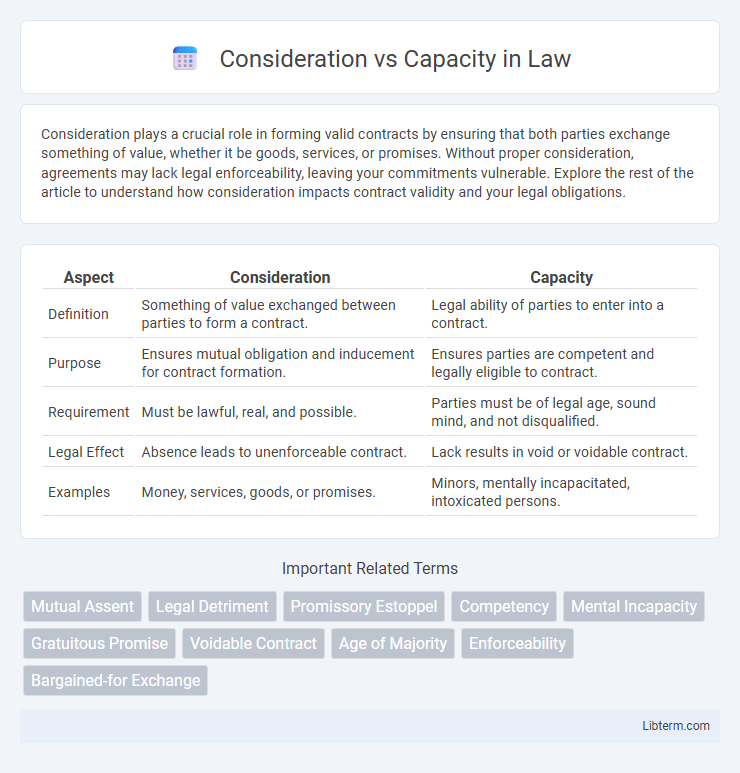Consideration plays a crucial role in forming valid contracts by ensuring that both parties exchange something of value, whether it be goods, services, or promises. Without proper consideration, agreements may lack legal enforceability, leaving your commitments vulnerable. Explore the rest of the article to understand how consideration impacts contract validity and your legal obligations.
Table of Comparison
| Aspect | Consideration | Capacity |
|---|---|---|
| Definition | Something of value exchanged between parties to form a contract. | Legal ability of parties to enter into a contract. |
| Purpose | Ensures mutual obligation and inducement for contract formation. | Ensures parties are competent and legally eligible to contract. |
| Requirement | Must be lawful, real, and possible. | Parties must be of legal age, sound mind, and not disqualified. |
| Legal Effect | Absence leads to unenforceable contract. | Lack results in void or voidable contract. |
| Examples | Money, services, goods, or promises. | Minors, mentally incapacitated, intoxicated persons. |
Understanding Consideration: Definition and Importance
Consideration represents the value exchanged between parties in a contract, encompassing goods, services, money, or a promise, which validates the agreement's enforceability. It serves as a fundamental element in contract law, ensuring both parties provide something of legal value, reflecting mutual consent and intent. Without adequate consideration, contracts may be deemed void or unenforceable, highlighting its critical role in establishing binding legal obligations.
What is Legal Capacity? Key Elements Explained
Legal capacity refers to an individual's ability to enter into binding contracts and make decisions that have legal consequences. Key elements of legal capacity include age of majority, mental soundness, and freedom from coercion or undue influence, ensuring the person fully understands the nature and effects of their decisions. Without legal capacity, agreements or contracts may be void or voidable due to lack of informed consent.
The Role of Consideration in Contract Formation
Consideration serves as a fundamental element in contract formation, representing the value exchanged between parties that validates mutual consent. It distinguishes binding agreements from mere promises, ensuring each party incurs a legal detriment or confers a benefit. Without valid consideration, courts typically deem contracts unenforceable regardless of capacity or intent.
Capacity to Contract: Who Qualifies?
Capacity to contract primarily refers to an individual's legal ability to enter into a binding agreement, typically requiring them to be of sound mind, legal age, and not disqualified by law. Minors, individuals with mental incapacities, and certain intoxicated persons generally lack this capacity, rendering their contracts voidable or void. Courts assess mental competency and age to determine qualification, ensuring that only those capable of understanding contract terms and consequences legally bind themselves.
Differences Between Consideration and Capacity
Consideration refers to the value exchanged between parties in a contract, while capacity relates to a party's legal ability to enter into a contract. The primary difference lies in that consideration ensures a mutual exchange of something of value, whereas capacity determines whether a party is legally competent, such as being of legal age or mentally sound. Without valid consideration or sufficient capacity, contracts may be deemed unenforceable or voidable under contract law.
Common Issues with Consideration in Contracts
Common issues with consideration in contracts include insufficient consideration, where the value exchanged does not meet legal requirements, and past consideration, which is not valid as it does not constitute a current bargain. Another frequent problem is illusory promises, where the consideration is vague or lacks mutual obligation, undermining contract enforceability. Courts often scrutinize these factors to ensure that each party provides something of legal value to support the contract.
Legal Implications of Incapacity
Legal implications of incapacity significantly affect the enforceability of contracts, as parties lacking capacity, such as minors or individuals with mental impairments, often render agreements void or voidable. Courts may intervene to protect incapacitated parties from exploitation, emphasizing the necessity of clear evidence demonstrating incapacity at the contract's formation. Understanding the distinction between consideration and capacity is crucial because even a contract with valid consideration may fail if one party lacks legal capacity to consent.
Real-world Examples: Consideration vs Capacity Disputes
Consideration disputes often arise in contract modifications where one party claims the lack of new value or benefit, as seen in construction contract change orders challenged for insufficient additional consideration. Capacity disputes commonly occur when minors or mentally incapacitated individuals enter contracts, such as voiding car purchase agreements due to lack of legal capacity. Courts frequently address these issues by examining whether genuine consideration was exchanged and if parties had the legal ability to contract, impacting enforceability in real-world scenarios.
How Courts Decide: Consideration Versus Capacity Cases
Courts analyze consideration by verifying the existence of a bargained-for exchange that holds legal value, ensuring both parties have provided something of measurable benefit or detriment. In assessing capacity, judges examine whether a party has the mental ability and legal competence to enter into a contract, often considering factors like age, mental state, or intoxication. Disputes hinge on evidence such as contract terms, conduct of parties, and expert testimony, with courts prioritizing protection against unfair agreements while upholding valid contracts.
Best Practices for Ensuring Valid Contracts
Ensuring valid contracts requires a clear understanding of consideration, which involves the exchange of something of value, and capacity, which confirms parties' legal ability to contract. Best practices include verifying that all parties are legally competent, such as being of sound mind and age, and that consideration is adequate and mutually agreed upon to prevent disputes. Documenting these elements thoroughly in the contract supports enforceability and minimizes the risk of void or voidable agreements.
Consideration Infographic

 libterm.com
libterm.com